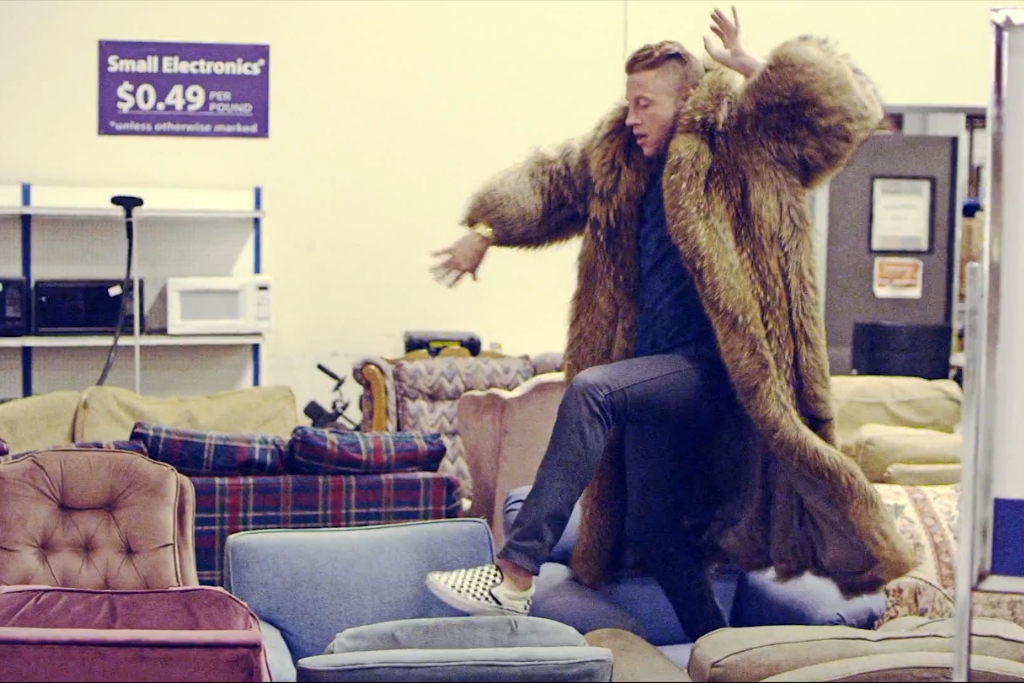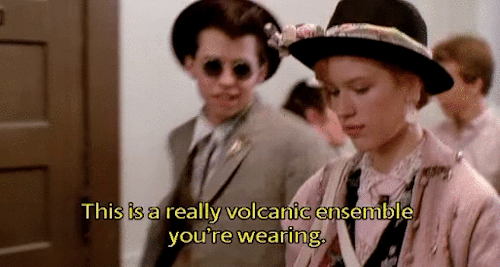Macklemore Was Right: Why Op-Shopping Offers The Best Value For Your Ethical Fashion Dollar
It's National Op Shop Week, and there's never been a better time to wean yourself off the fashion industry.

By now, you should be well aware that most clothing is made under poor working conditions. It’s been 15 years since Naomi Klein’s influential book No Logo mainstreamed the concept of “export processing zones” , where well-known branded merchandise is produced cheaply in developing countries under sweatshop conditions.
And Lucy Siegle’s book To Die For, which specifically investigates unsustainable garment industry practices, was released back in 2011. Siegle, a journalist on ethical living for The Observer, regularly appears in the media repeating her chief clothes shopping maxim: don’t buy a garment unless you can commit to wearing it 30 times.
But it was the 2013 collapse of the Rana Plaza building in Dhaka, Bangladesh that most strongly focused worldwide attention on the human cost of low-priced ‘fast fashion’. The final death toll was 1,129, and 2,515 more people were injured; it’s the deadliest garment-factory accident of all time.
A new documentary, The True Cost, screening in Melbourne next week as part of the Environmental Film Festival, delves into the social and environmental impacts of the global clothing and textile industry, bringing us face to face with the real people who make our clothes.
–
How Do We Choose What ‘Good Value’ Is?
Much of the post-Rana Plaza discussion of ethical fashion has focused on helping consumers make more ethical clothing choices. But the situation is not that simple. Clothing companies have wildly differing levels of transparency regarding the conditions under which their clothes are made. It’s not always sinister; sometimes they just can’t monitor all their contractors, subcontractors and sub-subcontractors. Supply chains are really, really long – see how many people it takes to produce a can of Coke.
Campaigns to encourage ethical clothes shopping often adopt the very neoliberal rhetoric that an individual’s buying power can be an agent of change. But unions, NGOs and governments can much more effectively agitate to improve garment industry regulations. Basically, it will require the wholesale dismantling of free-market capitalism before people or the planet will be valued over the pursuit of profit.
Calls to prioritise ethics when shopping also don’t take into account that there are many other ways we assign ‘value’ to our purchases. ‘Fast fashion’ gets discussed as if it’s synonymous with mindless, impulsive consumerism; but some shoppers are never going to respond positively to insinuations that they are selfish or thoughtless. Rather, they value other things over ethics: thrilling at a bargain; coveting the latest trends; identifying with favourite brands; easily fulfilling a functional clothing need; or just finding clothes that feel good.
There is, however, one kind of shopping that simultaneously satisfies many different criteria of ‘good value’ – op-shopping. And this week happens to be National Op Shop Week, an initiative to promote op-shop charities (as opposed to commercial second-hand goods retailers).
While it still sometimes carries the stigma of ‘dead people’s clothes’, op-shopping now enjoys mainstream respectability, in contrast to its original reputation as cast-offs for the poor. Put it this way – Prime Ministerial spouse Margie Abbott is Op Shop Week ambassador, and she’s not short of a quid. Second-hand shopping has been rebranded as ‘vintage’ or as a reflection of ‘personal style’, while op-shop donations are framed neutrally as the results of ‘decluttering’ and ‘spring cleaning’ rather than as acts of charity or offloading deceased estates.
Op-shop clothes are cheap and encompass a vast range of seasons, styles and fashion periods, so they appeal to fast fashion fans, retro fashion aficionados, utility shoppers, trend-seekers and bargain hunters alike. But some second-hand clothes are also beautifully made from luxury materials, or are from well-known labels, so they can satisfy shoppers who value ‘quality’, timeless ‘elegance’ and status symbol brands.
No matter what goals motivate your clothes shopping, you can achieve them in an op shop. And you can kick ethical goals, too.

–
Op Shops Have Excellent Ethical Credentials
Remember Lucy Siegle’s at-least-30-wears rule? People aren’t following it. In a 2013 survey of 889 Australian women, 62% reported owning clothes that had never been worn or still had their original tags attached. And 83% of respondents had clothes in their wardrobe that they had only worn once or twice.
So we’re not very good at restraining our individual purchases. But we do have a strong culture of donating to op shops – 97% of the survey participants had done so at least once. So op shops allow the community access to a pool of garments that, under regimes of individual consumerism, would sit uselessly in wardrobes, wasting the considerable material, human and logistical resources that went into producing them.
Because whether or not you avoid buying fast fashion, other shoppers still do. If you value the labour of garment industry workers, and think it’s outrageous that people buy them so capriciously, why not give the clothes some proper wear so that all that labour hasn’t been wasted?
Op shops are also the first stop in a system of recycled clothing that extracts extra value from these textiles. Only the nicest donations actually make it into op shops, and only the worst donations go to landfill (mostly rubbish dumped at collection points). The other garments are on–sold to companies that sort and repackage them for international sale, or break them down for industrial rags. This ecosystem provides employment to people around the world, from Australian sorting workshops to African second-hand clothing markets.
Shopping at op shops is also more than a consumerist performance of social responsibility. Rather than rewarding private-sector fashion companies that advertise sustainability as a marketing tool, your money funds charity organisations to continue their valuable work in the community.
Charities participating into National Op Shop Week include Vinnies, the Salvos, Red Cross, Lifeline, the Smith Family, the RSPCA, Brotherhood of St Laurence, the Animal Welfare League, the Asthma Foundation, Anglicare, MS Australia, Uniting Care, Mission Australia and Youth Off The Streets.
A great range of items, no matter what you’re looking for. Giving perfectly good clothes a second chance. And putting your ethical dollar to work in the community. Op-shopping is a win/win scenario, no matter what you value most.

National Op Shop Week runs until August 30.
–
The True Cost Screening And Panel Discussion:
Panel discussion featuring:
Molly Harriss Olsen – CEO Fairtrade Australia / New Zealand
Fabia Pryor – RMIT / Kangan Institute
Siggi McCarthy – Ethical Clothing Australia
Panel facilitator: Anna Horan
Friday September 4 from 6pm, at Kino Cinemas on Collins Street, Melbourne
Tickets are $16-19 and available form here.
The Environmental Film Festival runs in Melbourne from September 3-10, in Canberra from September 11-12, and in Hobart from September 18-21. Check out the full program here.
–
Mel Campbell is a freelance journalist and cultural critic. She blogs on style, history and culture at Footpath Zeitgeist and tweets at@incrediblemelk.